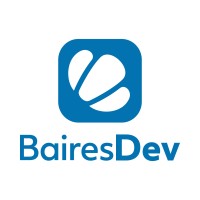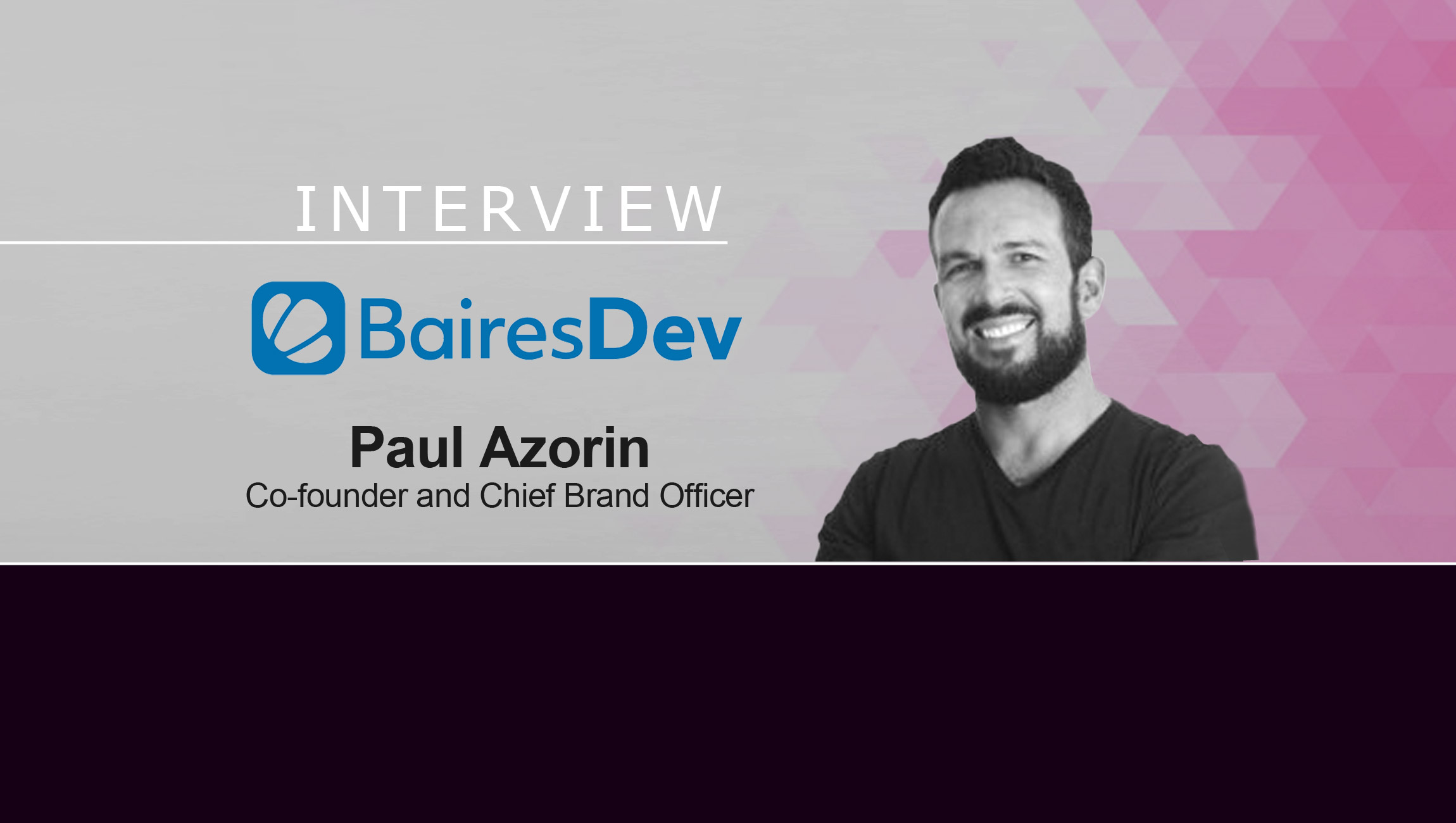Paul Azorin, Co-founder and Chief Brand Officer, BairesDev joins us in the chat to share a few thoughts on the changing trends in B2B IT Services while taking us through BairesDev’s remote work culture: _____ I got into technology at a very young age, as I was always fascinated by all things digital. When I was a very young teenager my parents couldn’t afford to buy me a computer, so I did odd jobs and built my first computer piecemeal. That led me to become a software engineer, a career that wasn’t too popular when I was growing up. Once I graduated, I quickly became a software architect because I discovered that I liked making decisions about technology on a higher level. That naturally made me go into management, first as a team leader and then as a project manager. During that time, I worked for big companies like Hewlett-Packard, Electronic Arts, and Nike. Marketing Technology News: MarTech Interview with Shalin Jain, CEO at HappyFox But I wanted something more, something different. And when I met Nacho De Marco, BairesDev’s CEO and co-founder, I found someone that had a similar vision: to create something innovative and unique that combined my love for technology with the future that was fast approaching. We knew first-hand how much engineering talent was needed, and we could see that the logical result of the digital revolution was a critical software engineering talent shortage. At the same time we knew that there was a huge untapped engineering talent pool in Latin America. BairesDev was born out of that sentiment and I’m extremely happy with it, as it allowed me and Nacho to fulfill our vision. Today, I’m doing a job I love – I’m the company’s Chief Brand Officer and it’s my responsibility to outline and communicate BairesDev’s vision and mission while fostering innovation in everything we do. BairesDev is the fastest growing Technology Solutions company in the Americas. We are a digital acceleration expert partner, specialized in solid end-to-end delivery of tailor-made technology solutions bringing innovative, scalable, and competitive results. With a team of +2000 high skilled professionals, we serve a wide range of clients, developing technology solutions for Startups, Middle-Market Businesses, and more than 10% of Fortune 500 Companies, across all industries. Our applicant pool is the largest in the industry: over 1.2 million Software Engineers apply to work with us each year. We hire only the Top 1% IT Talent, creating solid teams of 100% bilingual veteran developers. Back in 2009, I was living in Argentina while Nacho De Marco was working in Australia. We talked often about our idea of building a software development company and analyzed the way we could go about to do so. And then we realized that, even with the vastly different time zones and reduced availability regarding online collaboration tools, we were both working together as a team, real-life distances be damned. In the new normal, remote work is very familiar to everyone, but 12 years ago this was still odd for most people. We understood that there was a lot of potential in working remotely, which is why we made the decision of using distributed teams as the basis of our operations. With that in mind, we decided to tap into the Top 1% IT talent in Latin America, a region that was booming with highly-educated professionals. We chose to target the US market, which was already in dire need of software engineers, and took advantage of the continent being in similar time zones to offer a Nearshore service. Also we knew that we had another advantage on other regions, the cultural similarities between the USA and Latin America are much greater than with Asia or Eastern Europe. We took it to heart to convince everyone from clients to collaborators, that remote working was the smart way to follow. More than 12 years later, I’m working from Barcelona while Nacho is working from California, overseeing more than 2,000 bilingual collaborators spread across the globe. We successfully partnered with some of the biggest brands in the world. And, every year, we have the pleasure of hiring expert engineers to help us evolve even more. That’s possible because of remote working, what we call “smart work” and which has become our own “business as usual.” We mounted real home offices, inaugurated innovation hubs, and developed detailed and robust online processes to work with distributed teams. This allowed us to grow at a tremendous rate to become the company we are today. We’ve grown at over 50% rate for the last 5 years, yes even in 2020, but this year will be our best year ever with a projected growth of 75%. That’s why I always say that companies shouldn’t shy away from remote work. Collaborating with distributed teams can be efficient, productive, and provide excellent results. BairesDev is a living proof that, while we might not go back to the mainstream definition of “business as usual”, maybe we can all redefine what that means, including the smart method that has worked for us for so many years. There are several tools that companies can use, from reliable video conferencing platforms, to digital collaboration software, to cloud-based connectivity, and a data-centric approach to strategic decision-making. But all of them won’t work without empowering your teams to work together, without breaking down the information silos that might have formed naturally. At BairesDev we have tried different technologies and platforms as they appear in the market and also we have developed our own tools in-house, like our ERP or Staffing Hero™, our AI-powered team selection suite that suggests the most suitable employees to staff and execute our clients’ projects by matching past performance, tech proficiency, industry expertise, current availability, and clients’ characteristics. We also have a continuous improvement mindset and are willing to try or develop the best tools that enable our people to succeed in their roles, increasing collaboration, boosting productivity, or improving their user experience applying a Design Thinking process. Being a remote-first company has helped us take down many barriers: from achieving work-life balance to building truly diverse teams where everyone is always welcome. I’ve seen countless times how diverse teams benefit from software development, and I’m happy we are taking this forward thanks to our distributed structure. So I believe that remote work will lead to companies focusing more on the talent rather than on whom the person is or where he lives, which ultimately will translate into more productive and innovative teams. In my experience, the projects with the most outstanding results aren’t based on a specific technology, but on the deep understanding of the business needs and the collaborative relationship between team members regardless of their roles, departments, or whether they are in-house or not. We are using Zoom, Jira, Slack, Google Suite as collaboration and communication tools within our teams and they are working really well for us. Of course, we’ve tailored them to our needs and that’s another thing – technology only works if companies make them work for them. Unless it’s custom made, no tool is plug-and-play. Marketing Technology News: MarTech Interview with Kaycee Lai, CEO and founder of Promethium We also design how performance is going to be measured. We use the OKR framework for defining and tracking objectives and their outcomes. Instead of focusing on tasks, OKRs encourage individual accountability in every step of achieving success through metric indicators. We also have a Continuous Performance Team who provides Efficiency and Productivity guidelines, designs Performance Evaluations and Training programs to improve our products, services, or processes. I also want to say that I understand that a 100% remote work environment isn’t possible for all industries or companies, but one approach that could benefit everyone (companies, employees and communities) is the principle of trust, collaboration, and communication between teams within the company. That’s not just within your company: you need to trust your partners (across the value chain) the same way. Then, technology will enable people to collaborate faster, better and in real time, positively impacting efficiency and productivity. Over the last 4 years, our company has sustained an average annual growth rate of 52% by staying true to its vision: we support the digital acceleration of our clients by delivering high-quality software solutions that always match their needs, regardless of their specificity. When it comes to services, we specialize in end-to-end delivery of tailor-made tech solutions that bring innovative, scalable, and competitive results to the table. That’s why, at the start of every project, we work closely with each client to build the perfect custom software development team for their needs. After that, our top engineers use agile methodologies to integrate seamlessly with their in-house team and business operations, guaranteeing the smoothest workflow and highest-quality IT service possible. Last year, in response to the pandemic and its related challenges, we decided to revamp our most-requested services and refocus on what mattered most for our clients: generating tech-driven value faster than ever before. Our Dedicated Teams and Solution Architects services were the most impactful in this strategy. For starters, Dedicated Teams are autonomous groups that provide custom-made tech solutions for a single project. To satisfy the new needs our clients had in 2020, we reoptimized our custom team build-up time by refactoring key parts of our proprietary Staffing Hero™ algorithm. Now, most Dedicated Teams integrate with our clients’ operations in just a few days, and BairesDev clients can now start and finish projects at incredibly fast rates without compromising quality. Many of our clients were also interested in using the pandemic as an opportunity for innovation. To help them with that, we expanded the feature set of our Solution Architects service, where veteran software engineers, true experts with hundreds of projects under their belts, define the best approach to defining project scopes and executing roadmap solutions. After some operational improvements, we started to offer a brand-new two-week swift design sprint that included a detailed communication plan, a defined architecture and technical approach, and the product’s roadmap and backlog with all security and non-technical requirements. The main objective of all this is to help our clients with their digital acceleration processes. We know that the only way to be sustainable moving forward is being agile, data-driven, and digital-first, things that companies can only achieve through technology. We aim to keep providing solutions that help our clients achieve all that. Digital transformation has become the table stakes for all competitive organizations. Some of our clients had a Digital Transformation plan already developed, but now they are seeking to accelerate the process because they need to provide answers to today’s challenges fast. Others are digital by design and they are focusing on constant improvement and innovation. Both of them have in common that they need to ditch the traditional digital transformation process and aim for a digital acceleration process, which is more than just a faster digital transformation. A digital acceleration process is about strategically implementing new technologies that provide value today while updating the core IT infrastructure that supports it all. It’s about adapting the business operations and practices to increase the agility and provide quick solutions for the ever-changing markets of today. Thus, the importance of digital acceleration lies precisely in how it prepares companies to keep providing value for customers and markets that show quickly shifting demands. We are digital acceleration experts, in solid end-to-end delivery of tailor-made technology solutions bringing innovative, scalable, and competitive results. We partner with companies that are already on the path of business transformation to help them capture value faster by improving their customers’ experiences and satisfying their needs. After COVID-19, it’s become abundantly clear that there is no way back to “normal.” That means that some of the practices that emerged during the pandemic are here to stay, things like contactless delivery or online grocery shopping. Those things already reshaped people’s expectations, so now experiences with brands, products and services need to be frictionless, contactless, seamless and consistent across channels and devices. Simply put, people got accustomed to that. For companies in the B2B IT Services industry, this is a positive trend, because almost every company is looking to integrate tech solutions across their products, services, and processes. But there’s something else, as this shift isn’t just a question of adding new tools or technologies. The pandemic-related changes and the challenges that resulted from them now require strategic thinking, expertise and collaboration to understand, design and develop the best technology solution to address customer needs, generating value. Marketing Technology News: MarTech Interview with Eric Theobald, SVP of Products and Engineering at CareerBuilder BairesDev is a fast growing Technology Solutions company in Latin America
Paul Azorin is the Co-founder and Chief Brand Officer, BairesDev
Tell us a little about yourself Paul…we’d love to hear about BairesDev?
Tell us your experience starting and setting up BairesDev being remote, how has the journey been and seeing how the demand to collaborate remotely is increasing across industries today, what top thoughts would you share?
Adding to that, what top technologies would you like to talk about that can enable more seamless processes across departments (marketing/sales/HR/IT) as teams continue to work being remote in today’s business climate?
What are your thoughts on the future of remote work and the future of in-demand technologies that will serve changing user needs (across departments)?
Take us through some of BaireDev’s upcoming events and upcoming offerings that users can look forward to?
You mentioned digital transformation and digital acceleration, what are the differences and why is it important?
What big trends do you believe are changing your industry specifically?

MarTech Interview with Paul Azorin, Co-founder and Chief Brand Officer, BairesDev

[vc_tweetmeme]
[vc_tta_tabs][vc_tta_section title=”About BairesDev” tab_id=”1544515685282-bf64247e-9d9aeec0-8908″][/vc_tta_section][vc_tta_section title=”About Paul” tab_id=”1544515685339-cf6c9bcd-6b1aeec0-8908″]
[/vc_tta_section][/vc_tta_tabs]
[vc_tweetmeme]











